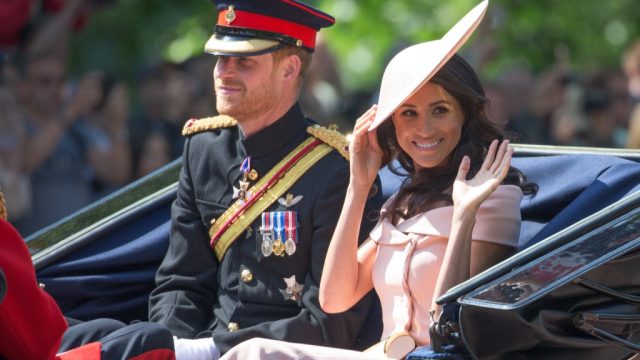Here’s Why Linguists Say Meghan Markle’s New British Accent Isn’t Fake

A video of Meghan Markle greeting crowds in Cheshire, England, made the rounds last month after the footage revealed that brand-new Duchess of Sussex seems to have adopted somewhat of a British accent.
While it’s by no means a totally different accent, like the bizarre one that Lindsay Lohan decided to try out, her enunciation is markedly crisp, and she uses a lot of the lingo employed by British royals.
Meghan said my name, that’s me done😭 pic.twitter.com/167F2ubjUh
— Aya El Zeiny (@elzeiny99) June 14, 2018
Social media immediately erupted with tweets calling Meghan a “phony” for putting on an accent just a few weeks after marrying Prince Harry.
Meghan Markle is a lil phony for that fake British accent coming through
But if I became British royalty you’d see me day 2 saying pip pip cheerio
— Shan (@shoy_7) July 5, 2018
But linguists are not so sure that her new way of speaking is entirely unauthentic.
Jevon Heath, a visiting lecturer in linguistics at the University of Pittsburgh, told The Cut that while it’s very rare for adults to fully absorb a different accent naturally, especially in a matter of weeks, it’s not uncommon to pick up a certain twang fairly early on.
Linguists call it “phonetic accommodation” or “phonetic convergence,” and it tends to happen on an unconscious level—and it’s something that I can attest to.
When I was studied abroad in England, my accent remained thoroughly American, but I couldn’t help but notice that by the end of a single year my “a’s” had started to sound more British, and I had started to use more traditionally British intensifiers, such as “Yes, the show was quite good,” or “Yes, that was rather dull, wasn’t it?” It’s accommodation like this that jumps out in the video much more so than an actual accent, such as when she says, “Did you?” when most Americans would say “You did?”
Contrary to popular belief, this isn’t an affectation, but rather something that often occurs when you’re constantly surrounded by people who have a different dialect. Psychologists call this tendency to tweak our intonation to that of the person we’re speaking to “code-switching.”
“All of us subtly shift our accents and ways of speaking depending on who we are talking to all the time—think about how you speak when you’re at home with your family versus at work,” Jennifer Nycz, an assistant professor of linguistics at Georgetown University, said. “Generally, people talk like the people they talk to.”
Code-switching has its purposes as well, as it helps to bridge the gap between you and the person with whom you’re speaking. In fact, a 2010 study even found that imitating someone’s accent helps you better understand the person with whom you’re conversing.
Some linguists believe that people are reading too much into the video in general. For example, expert Dennis Preston told Yahoo Lifestyle that he didn’t pick up on anything out-of-the-ordinary in the way Markle spoke in the now-viral video.
“I did a very careful listen, paying specific attention to her vowels, a big giveaway with British accents, as well as the intonation. I just didn’t find anything resembling a British accent,” he said.
One thing is for sure: Markle is certainly adapting (to use a Britishism) swimmingly to her new surroundings, and the Queen reportedly adores her. Which is a good thing, especially given that her relationship with her father is becomingly increasingly testy.
To discover more amazing secrets about living your best life, click here to sign up for our FREE daily newsletter!